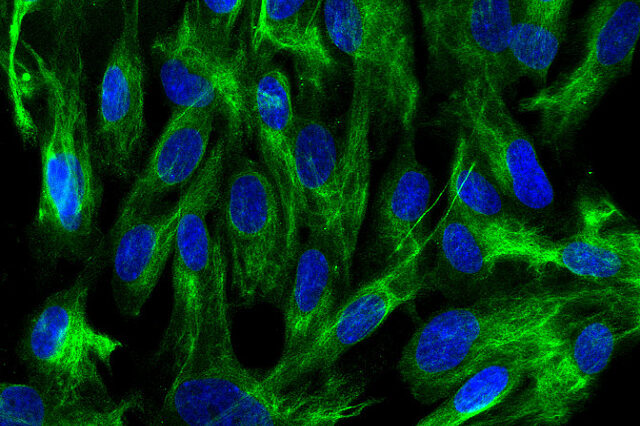UF Center for Regenerative Medicine recruiting for trial on potential therapy for autoimmune disorders

The University of Florida Center for Regenerative Medicine today announced the launch of a clinical trial to test safe dosages of umbilical cord-derived stem cells in the treatment of two debilitating autoimmune disorders.
The Phase I trial, in collaboration with the biotechnology company RESTEM, will include nine patients who will receive intravenous infusions of umbilical cord lining stem cells, or ULSCs, to treat dermatomyositis and polymyositis. These are rare conditions that can cause incapacitating muscle weakness and skin inflammation, which in turn can lead to serious problems with the body’s other organs, including the lungs and heart.
The trial is approved by the U.S. Food and Drug Administration and the Institutional Review Board at UF Health, a committee of physicians, nurses, pharmacists, researchers and community members that ensures patient rights and safety are protected.
The trial, which is hoped to also provide early evidence about the ability of these ULSCs to improve the condition of patients, is believed to be the first of its kind in the United States to test treatments for these disorders. If the Phase I trial is successful, a Phase II trial will be conducted to evaluate the effectiveness of a treatment in far larger numbers of patients.
“We’re excited to embark on this innovative and important research as we examine potential therapies for these intractable diseases,” said David R. Nelson, M.D., senior vice president for health affairs at UF and president of UF Health. “We are enthusiastic about this collaboration with RESTEM on this novel approach and grateful for the generous support of the donor.”
The current trial, which is supported through private funding, recently began recruiting patients, said Keith March, M.D., Ph.D., director of the UF Center for Regenerative Medicine. Several people have already been treated.
“In an autoimmune condition, the immune system attacks the body’s own tissue,” March said. “Our hope is that this novel stem cell approach will have an anti-inflammatory effect through a decreased immune response, thereby protecting the body. If the therapy works, this stem cell therapy might help patients avoid having to take immunosuppressive drugs with potentially significant adverse side effects. Right now, those drugs are the only known treatment for these disorders.”
March said that scientists believe that physiologically these cells play important roles in modulating, or influencing the body’s immune response, often by dampening the aggressiveness of that response.
For example, these umbilical cord lining stem cells have recently been used to treat COVID-19 patients in an attempt to suppress the runaway immune response that can be so deadly with novel coronavirus infection.
“It is a pleasure to work with the amazing regenerative medicine center at the University of Florida,” said Rafael Gonzalez, Ph.D., senior vice president of research and development for RESTEM. “We are excited to launch this study and explore the potential effectiveness of our novel and proprietary umbilical cord lining stem cell therapy.”
RESTEM and Carl J. Pepine, M.D., a professor in the UF College of Medicine’s division of cardiovascular medicine and the study’s principal investigator, are collaborating with Michael Bubb, M.D., an associate professor in the UF College of Medicine’s division of rheumatology and clinical immunology.
About the UF Center for Regenerative Medicine
The mission of the UF Center for Regenerative Medicine is to accelerate the discovery, development and delivery of cell-based therapies for patients with unmet medical needs. The center emphasizes a multispecialty approach, including medical, surgical and rehabilitation practices. Its physicians and scientists work in collaboration with researchers across UF Health and the nation as well as colleagues in the biotechnology industry to test and implement regenerative cell therapies targeting diseases that currently lack effective solutions, and to improve the lives of patients. In addition to the study addressing dermatomyositis, UF Center for Regenerative Medicine teams are conducting and planning multiple other regenerative medicine studies. These include studies evaluating cell-based treatments for severe heart failure requiring left ventricular assist devices, rare diseases including Duchenne muscular dystrophy and also more common health concerns such as osteoarthritis and joint pain/inflammation of the knees and lower back.
About RESTEM
RESTEM is an innovation-driven, clinical-stage biotechnology firm, based in Corona, California, dedicated to the discovery, development and commercialization of novel, next-generation, cell-based therapeutics and tools that aid in the treatment of a broad range of degenerative disorders. The company’s mission is focused on improving the quality of life for those who suffer from disabling diseases of the immune system, age-associated disorders and other degenerative diseases. With over 14 years of research and development focused on the company’s novel and proprietary, umbilical cord lining stem cells, or ULSCs, which have novel regenerative properties believed to be superior to mesenchymal stem cells, RESTEM has emerged as a major contributor to cell-based treatments with ongoing clinical trials that address significant unmet medical need across a range of diseases and disorders.
Media contact: Bill Levesque, william.levesque@ufl.edu or 352-265-9417
About the author
